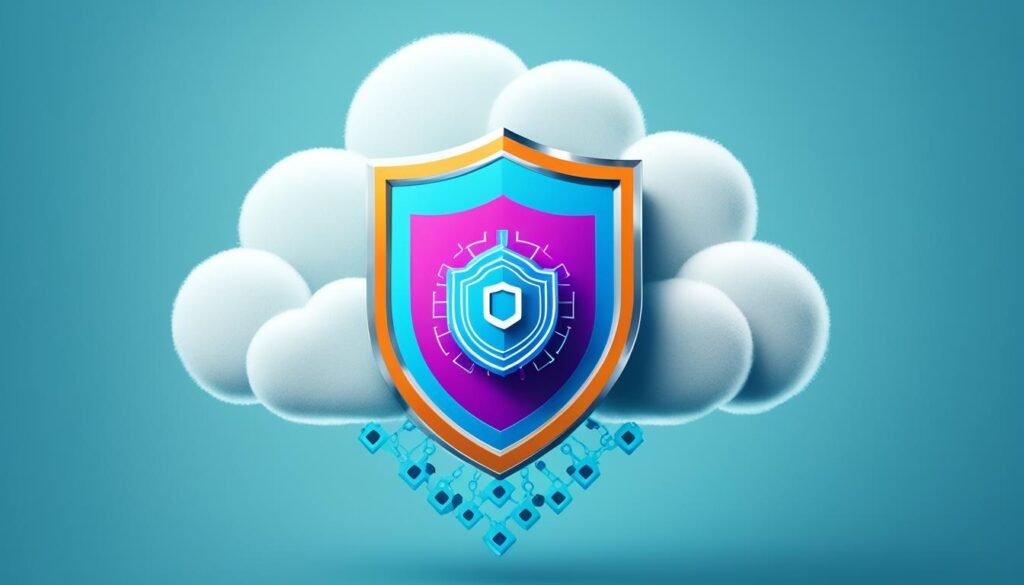Why do small businesses still get hit by cyber attacks with security tools available? It’s surprising. In our digital world full of threats, it’s crucial for small businesses to have strong cybersecurity. They need it to keep their valuable digital stuff safe.
Securing network connections, known as endpoint protection, is essential to block unauthorized access and keep data safe1. It’s important to have good antivirus software. It fights off many kinds of harmful software1. Using Next-Generation Firewalls (NGFWs) and Domain Name System (DNS) protection helps a lot. They control and filter data, keeping the network secure1. Email gateway security stops bad or unwanted emails from causing harm1.
But, just having great tools isn’t enough. You also need good planning, training for your team, and the ability to adapt as threats change. For small businesses, this big-picture view is key. It could mean the difference between overcoming cyber threats or closing down after an attack2.
Key Takeaways
- Effective cybersecurity is crucial for small businesses and includes tools for endpoint protection.
- Antivirus software fights against various malware1.
- Next-Generation Firewalls (NGFWs) and DNS protection ensure safe data flow1.
- Email security is key to protect communication1.
- Strategic planning and training help businesses stay secure as threats evolve.
Why Cybersecurity is Critical for Small Businesses
Cybersecurity is crucial for small businesses due to high risks and weak security. Small businesses often get targeted by cybercriminals, leading to big financial losses. Cyber-attacks on small businesses have been increasing for four years. Now, 36% of attacks aim at SMEs3.
Small businesses lose over $75,000 on average from cyber-attacks4. The costs of data breaches add up, including paying customers back, legal fees, and not being able to operate4. Knowing the effects of cybercrime is key. Without preparation, businesses might not recover.
The manufacturing sector saw the most cyber-attacks in 2022, with finance and insurance close behind3. This shows no industry is safe from cyber threats. Using cybersecurity helps small businesses guard against phishing, malware, and advanced ransomware5.
Training employees on cybersecurity is very helpful. It can greatly lower the chance of phishing attacks5. Strong password rules and using multi-factor authentication add extra security5.
Keeping software updated helps avoid hacker attacks5. Investing in custom cybersecurity tools, like antivirus software and intrusion detection, boosts data security5. With these steps, small businesses can cut down on cybercrime effects.
Having a detailed plan for cyber-attacks is important. It should include always having recent backups of important data5. Testing backups regularly and having a clear plan for communication helps during an attack5. Knowing who to contact quickly can make a big difference.
Basic Cybersecurity Tools Every Small Business Needs

Small businesses must focus on vital cybersecurity tools to protect their digital space. These tools are crucial for keeping important data safe and operations running smoothly.
Antivirus Software
Having strong antivirus software is a must for small businesses. It helps find and stop cyber threats like malware and viruses. To keep your systems secure, always update and scan regularly6.
Next-Generation Firewalls (NGFW)
Next-Generation Firewalls (NGFW) boost security by carefully checking data coming in and going out. With the help of advanced techniques like machine learning, they catch and stop complex threats more effectively2. It’s essential to keep these firewalls updated to prevent harmful attacks2.
Domain Name System (DNS) Protection
DNS protection stops network users from visiting dangerous websites. It acts as a shield, reducing malware risks. DNS security also blocks hackers from attacking through DNS weaknesses.
Email Gateway Security
Email security is key to keeping your communications safe from things like phishing and malware. It filters emails, blocking bad ones before they reach anyone. With phishing attacks being so common, strong email security steps are crucial7.
Together, these cybersecurity tools strengthen small businesses. They help fight off different cyber dangers and protect digital resources.
Advanced Cybersecurity Tools for Enhanced Protection

In today’s tech world, small businesses must use advanced tools to protect their online info. These tools help lower risks and make overall security stronger.
Endpoint Detection and Response (EDR)
EDR solutions play a key role in endpoint security. They watch and check endpoint activities to find and deal with threats quickly. This fast action stops serious harm. With 60% of smaller firms hit by cyberattacks, EDR greatly improves your defense8.
Intrusion Detection and Prevention (IDS/IPS)
IDS/IPS systems are essential for catching and stopping unauthorized access. IDS looks for threats by watching network traffic. Meanwhile, IPS blocks those threats. Since most attacks happen outside of business hours, having IDS/IPS protects businesses all the time8. These systems dig into data to catch and stop complex attacks.
Web Application Firewalls (WAFs)
WAFs are crucial for protecting web applications. They filter and watch HTTP traffic to block web attacks. By managing WAFs well, businesses ensure their data is safe and encrypted. WAFs are key for cloud security and shielding web apps from attacks.
Cloud-Based Security Solutions
As more companies use cloud services, cloud-based security becomes more important. These solutions protect against cyberattacks with advanced tech and strict rules. They keep data and apps safe in the cloud, following cybersecurity laws. Updating and backing up data within these systems is vital for growing cloud services9.
Essential Practices for a Strong Cybersecurity Posture
It’s key to have strong cybersecurity practices in a company. These practices help keep the digital world secure. By using good strategies and training employees, companies can fight cyber threats well.
Regular Employee Training Programs
Cybersecurity training is a must because it tackles security’s human side. By teaching staff how to spot and handle threats, you make your company safer. Training on things like phishing attacks is very important7.
It’s also crucial to train employees on security steps like using multi-factor authentication. Avoiding dangerous links matters too10. When everyone knows about security, the whole company is safer11.
Implement Multi-Factor Authentication (MFA)
Multi-factor authentication greatly improves security. It makes it harder for unauthorized people to get in10. Leaders should make sure everyone is using MFA and check on it10. This keeps the company’s info and systems safer11.
Regular Software and System Updates
Keeping software up to date is very important. It fixes security holes that attackers can use. Updating systems promptly is a must to stay safe7.
By updating regularly, you keep your cyber defenses strong. This helps protect against new threats11.
Securing Your Network Infrastructure
Network security is crucial in any cybersecurity plan. It’s important to have strong passwords, encrypted connections, and VPNs. Also, service providers might not update old equipment, leaving networks open to attack12. Devices in the network are often missed in security checks, making them targets for hackers12.
To boost security, adopt secure Wifi methods. Turn off protocols and services that aren’t encrypted or needed. Using tough password encryption and limiting remote access can make a big difference. Most small routers lack important security tools, like antivirus programs12.
Using SD-WAN technology can help manage traffic better, making the network safer and faster. Separating networks physically and virtually helps filter and isolate traffic effectively12. By segmenting networks, we can stop hackers from moving freely and limit attack spread12. It’s key to allow minimal access to important resources. Strong firewall rules and access lists can further secure the network.
It’s vital to use Multi-factor authentication (MFA) and manage admin access well. This approach greatly lowers the risk of unwanted access13. Keeping the network up-to-date and auditing it can help small businesses stay safe. They can spot and fix security gaps14.
Planning and Executing a Cybersecurity Response Plan
Small businesses need a strong cybersecurity plan to face and recover from cyber threats. This plan includes setting up response tactics, having strong data backup systems, and keeping the business running smoothly during troubles.
Incident Response Strategies
It’s vital for businesses to have clear steps to quickly deal with security breaches. Phishing is a common way attackers break into systems10. Firms must regularly practice their response plans to be prepared10. Even with solid cybersecurity, being ready to act fast is key15.
Data Backup and Recovery
Backing up data is essential to protect important business information. Firms are at risk if their backups are not up to scratch during ransomware attacks10. Keeping backups off-site or in the cloud keeps data safe and available in emergencies16. Regular backups are a core part of a company’s cybersecurity approach16.
Maintaining Operational Continuity
Keeping a business running smoothly involves planning for minimal disruptions. With society’s heavy dependence on technology, the stakes are high during cyber incidents15. Planning effectively for these events helps keep the business on track15.
Having clear roles and detailed plans helps reduce the effect of a cyberattack on operations. Small businesses boost their defenses by blending these strategies. This ensures they are well-prepared for cyber threats.
Conclusion
Protecting small businesses in today’s digital age is key to keeping assets safe and customer trust high. As cyber threats grow, it’s crucial to have a strong cybersecurity plan. This plan should combine top tools and key practices. Regular security checks also help find and fix any security gaps7.
A thorough approach uses vital tools like Antivirus software and Firewalls. It also includes multi-factor authentication to block attacks. Teaching employees about spotting phishing and keeping software up-to-date helps too. This builds a security-minded culture, which serves as a strong defense line17. Such a culture is essential in fighting against new threats.
Small businesses should also prepare for any security breaches. They need a plan that quickly and effectively handles these situations. This should cover how to back up and recover data. This ensures all important data is safe and can be accessed again17. With business interruptions costing up to $370,000 for small businesses, it’s vital to have a plan. This helps keep the business running smoothly, even during tough times7.
By focusing on education, improving security, managing data, and planning for emergencies, small businesses can create a strong cybersecurity framework. This protects their online assets and keeps customer trust. It also helps the business grow in a risky digital world. Using secure practices means businesses can stay safe from cyber threats, ensuring a bright future.
Source Links
- https://www.fortinet.com/resources/cyberglossary/smb-cybersecurity-tools
- https://usa.kaspersky.com/resource-center/preemptive-safety/small-business-cyber-security
- https://www.ifac.org/knowledge-gateway/discussion/cybersecurity-critical-all-organizations-large-and-small
- https://www.keepersecurity.com/blog/2023/08/28/why-cybersecurity-is-so-valuable-for-small-businesses/
- https://www.bankhillsboro.com/cybersecurity-for-small-businesses-protecting-your-digital-assets/
- https://nulab.com/learn/software-development/cybersecurity-small-medium-enterprises/
- https://netdiligence.com/blog/2023/11/essential-cybersecurity-strategies-for-small-to-medium-sized-businesses/
- https://www.crowdstrike.com/solutions/small-business/
- https://www.zekagraphic.com/cybersecurity-essentials-for-small-businesses-protecting-your-digital-assets/
- https://www.cisa.gov/cyber-guidance-small-businesses
- https://www.globalts.com/blog/the-3-most-essential-cybersecurity-best-practices-for-smbs
- https://www.cisa.gov/news-events/news/securing-network-infrastructure-devices
- https://www.linkedin.com/pulse/cybersecurity-best-practices-securing-your-infrastructure
- https://kloud9it.com/2024/06/the-top-10-network-security-best-practices-for-small-businesses/
- https://www.fema.gov/sites/default/files/documents/fema_planning-considerations-cyber-incidents_2023.pdf
- https://ccpcopy.com/articles/cybersecurity-essential-strategies-for-small-business/
- https://www.institutedata.com/us/blog/cybersecurity-checklist-for-small-business/




0 Comments